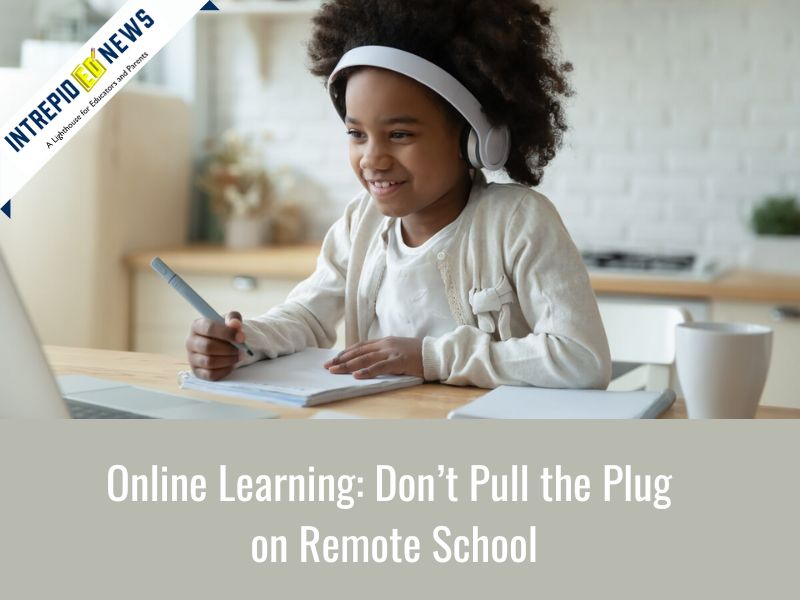This article is republished with permission from Intrepid Ed News
– Will Richardson
If there is any good news that has come from the last 16 months of disruption in schools it may be that a small but not insignificant segment of students around the world actually flourished in online, remote school environments. Their grades improved, they were happier, and their general sense of wellness improved. In other words, they found a better way of doing school.
So why is it then that so many schools (and some states) are now saying they will not offer a remote option this coming school year?
Honestly, it’s just another example of why my general sense of schools and schooling is increasingly troubled. Once again, we’re not putting our children first.
No question, running a school is complex, and difficult. In these pandemic times, that’s been especially true. Five-year “strategic plans” have turned into five-day plans. And I’m not suggesting that given the current typical school design that we can meet every child’s needs every time.
But in this moment of transition in the world, it’s fair to challenge all of our designs at a fundamental level. We might ask who benefits most in the decisions we choose to make?
In not offering a virtual option, schools benefit in many ways. There will be less expense, less stress on teachers, less worrying about technology. It’s the efficient move to make, no doubt, especially after the exhaustion of this past year.
But are those outcomes really as important as the well-being and increased “success” that a good number of our students have experienced in the virtual school space?
Let’s be honest: schools don’t work for a lot of kids. Many are bullied. Far too many are bored. For those who are naturally introverted, a day at school can be a brutally uncomfortable experience. We can’t operate as if “one size fits all” in either our academic efforts or in our work to develop our students as productive, engaged, good humans.
Remote schooling is another “size” if you will that we can offer to our students. And while there are already many options from various statewide virtual schools that kids can tap into, I’d argue that a local version that can help them relate what they’re studying to their own lived experience could be a much more powerful alternative.
And the parallels to what we adults are now demanding in the grown-up world are apparent. All of a sudden, we’re talking about “work from home,” four-day work weeks, and new and different organizational structures to support the potential power of an Internet connection to create and collaborate. It’s becoming increasingly clear that the ability to self-organize and self-motivate are fundamental skills that employers are already seeking more than just a couple of years ago.
It’s so apparent that the larger arc of the world has been changed dramatically by the events of these last few months. In so many ways, we’ve been forced to engage in new practices, new ideas, and new conversations about who we are and who we want to become. The world is demanding not a retreat away from the changes we’re living through but, instead, an embrace.
On a meta level, our change in education is that all of us now understand that a school is not necessarily a brick and mortar place where we collect the students, teachers, knowledge, and technologies to pursue learning. And we should understand more deeply that as much as that physical space experience may feel like the ideal, for many children, it’s simply not.
We need to embrace that, not deny it.
A former public school educator of 22 years, Will Richardson has spent the past 15 years developing an international reputation as a leading thinker and writer about the intersection of social online learning networks, education, and systemic change. Most recently, Will is a co-founder of The Big Questions Institute which was created to help educators use “fearless inquiry” to make sense of this complex moment and an uncertain future. In 2017, Will was named one of 100 global “Changemakers in Education” by the Finnish site HundrED, and was named one of the Top 5 “Edupreneurs to Follow” by Forbes. He has given keynote speeches, lead breakout sessions, and provided coaching services in over 30 countries on 6 continents. He has also authored six books, and given TEDx Talks in New York, Melbourne, and Vancouver.
This article is republished with permission from IntrepidEd News
























